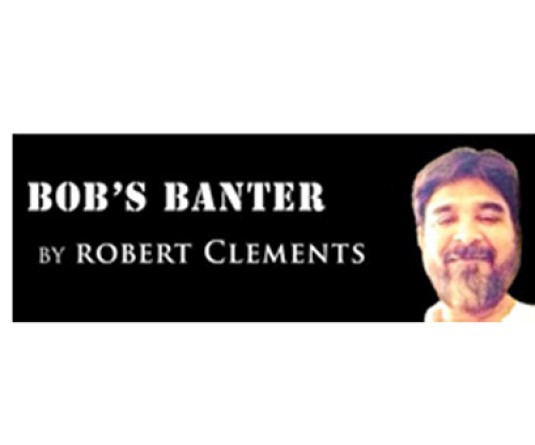
Arkotong Longkumer
“I owe the discovery of Uqbar to the conjunction of a mirror and an encyclopedia. The mirror troubled the far end of a hallway in a large country house on Calle Gaona, in Ramos Mejia; the encyclopedia is misleadingly titled The Anglo-American Cyclopaedia (New York, 1917), and is a literal (though also laggardly) reprint of the 1902 Encyclopædia Britannica.” Thus begins one of my favourite story, Tlön, Uqbar, Orbis Tertius, by that great Argentinean writer Jorge Luis Borges.
The quixotic story attempts to cloak fiction in reality—that at the end of the tale, one rushes—dizzy with intense intrigue—to the National Library (as Borges does) in an attempt to discover Tlön, Uqbar, Orbis Tertius. Endless maps, ancient texts, volumes upon volumes of Encyclopædia with its infinite algebra of possibilities are devoured; page after page caressed as if the vast stretches of the Empire and its beautiful Harpies suddenly spring to life. One reads again the description that Borges offers on Orbis Tertius “with its architectures and its playing cards, the horror of its mythologies and the murmur of its tongues, its emperors and its seas, its minerals and its birds and fishes, its algebra and its fire, its theological and metaphysical controversies—all joined, articulated, coherent, and with no visible doctrinal purpose or hint of parody”. The exercise in parody is reflected by the paradoxical fantasy of reality itself being fictional: often the two are confused. That, at least, is what one gets by reading Borges.
With Borges reality is painted by a fine brush with an Infinity of angles, colours, and artists—all, perhaps, seeking some sort of escape from Magical Mirrors, Forking Gardens, Labyrinths, Sands, Gods, Tigers, Books, Duels, Ruins, Ancient Civilisations. Borges himself, obsessed with mirrors and reading (his encyclopaedic knowledge is reflected by the volumes of essays and his erudite compositions, an effort in myth-making) was reduced in the final stages of his life to a blindness that a writer of his magnitude bore with immense courage. He continued writing—a due owed to the sensibilities of his Art.
The discovery of Uqbar, which is owed to the conjunction of a mirror and an encyclopædia, strangely reflects an irony of the haunting conclusion to Borges’ life: that the mirror only hovers, shadowing him, though he “discovered that there is something monstrous about mirrors”. In his delightful essay, Covered Mirrors, the “infallible functioning of mirrors”, “their cosmic pantomime, would seem eerie to me”. His prayer to the angels to cover the mirror was bestowed upon him through his terrible blindness, while the encyclopaedic discovery of Uqbar was not just another conjunction, his sight for reading was taken away too. The juxtaposition of his life to his stories hardly seems coincidental. Islam, he says, tells us that on the day of judgement, anyone who has glorified images of living things will “reawaken with their works, and will be ordered to blow life into them, and they will fail, and they and their works will be cast into the fires of punishment”. His life and work barely conforms with this image, one can place him as the—only—one who does manage to blow life into them, which only merits another Borges story.
The catalogue of Borges’ work centres around the vastness of accumulated knowledge that is, in his stories, “the universe (which others call the Library)”. His metaphysical reflection on the Library in the essay, The Library of Babel, evokes a certain imagery that is perhaps too complex a meditation on the hexagonal placements of galleries and its incessant yearning for geometry and geography.
This is the infinite repository where books, like the World Wide Web, are logged and catalogued. He wonders, what would it be like if the words from one book circulate and exchange places with the other without the reader being aware of the deft structure of the text? For Borges, the Art of Reading and the structure of the library are commensurable with the discovery of oneself, as he says, “in my younger days I traveled; I have journeyed in quest of a book, perhaps the catalog of catalogs”.
He elegantly discounts the sheer casualness of people who dismiss a book, or shelves of them, in a single brush of the hand, losing the reader countless volumes of knowledge. The comment resonates but, more, his life was lived in a fascination with books—in their magnitude—which is a breathtaking summation of his life. He was the champion of how reading should be done, and how one must approach the library with the deft footprints of a traveller. Not only does reading open up new possibilities to venture into Infinity, but “the Library”, similarly, “is unlimited but periodic”.
The metaphysics of Borges does not obscure things, nor does it drain the mind dry of ideas—instead it is the spring from which imagination gushes. Fiction in itself represents a form of reality and as Borges has often showed, life must mimic Art and vice versa; one should not limit, but instead open the mind to endless possibilities. In a memorable ending, Borges remarks how he often does not clarify the adjective “infinite”. He says it is out of mere rhetorical habit, by which he means that Infinity is not at all illogical. By offering us this metaphysical puzzle to ponder on he surprises us with another elegant epigram: “If an eternal traveler should journey in any direction, he would find after untold centuries that the same volumes are repeated in the same disorder—which, repeated, becomes order: the Order. My solitude is cheered by that elegant hope”. So is mine. Imagine a Library.
(The writer is pursuing studies on Culture and Religion from Edinburgh University, UK)






